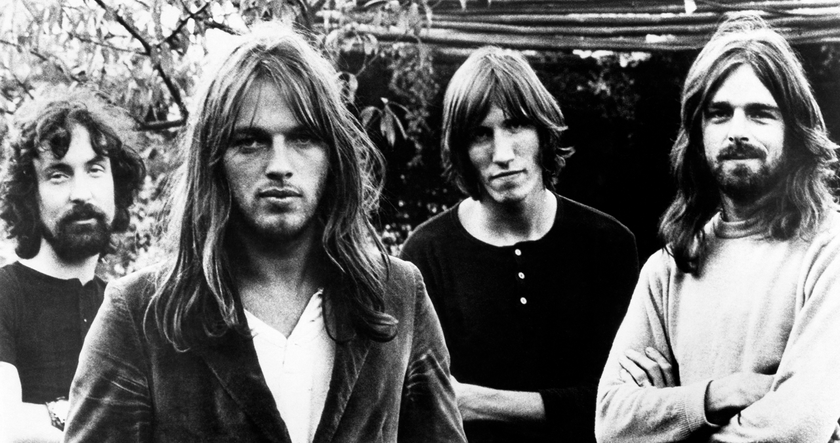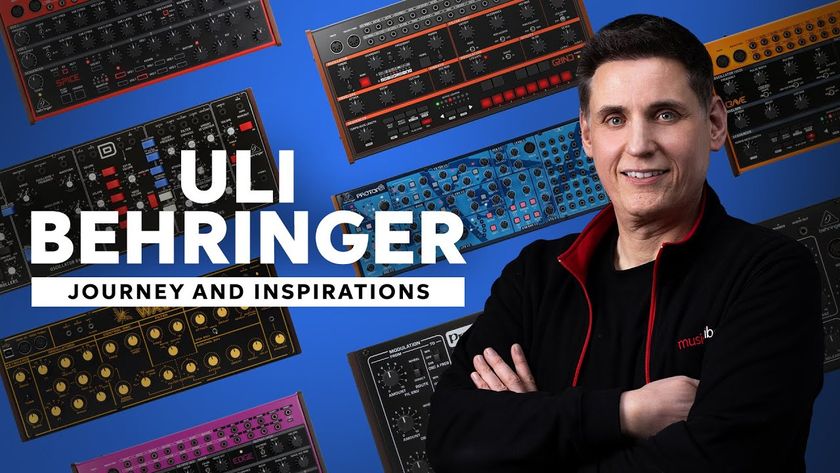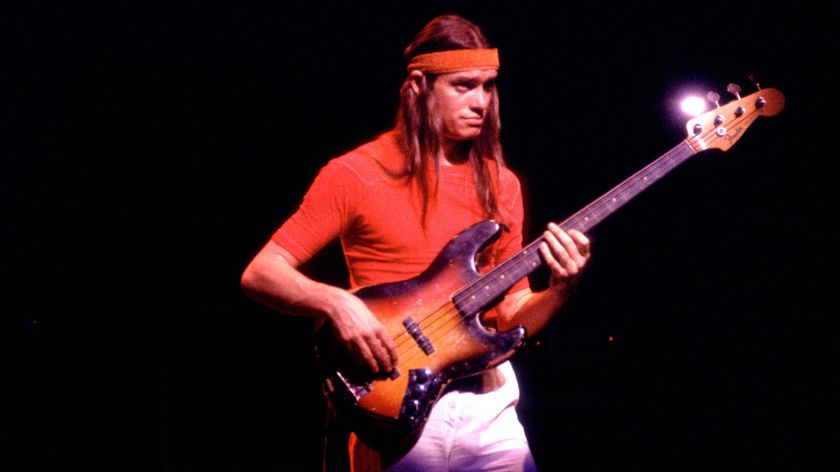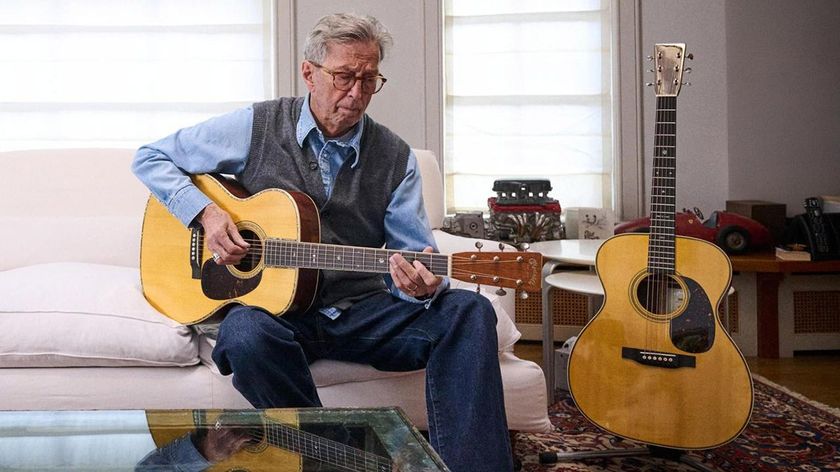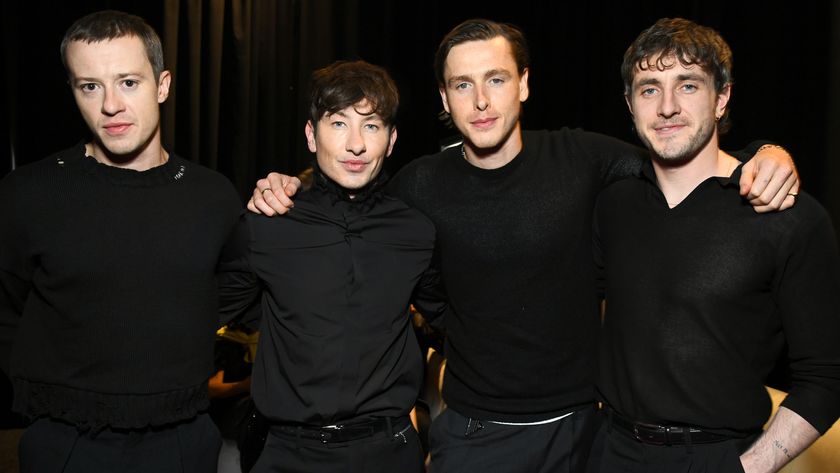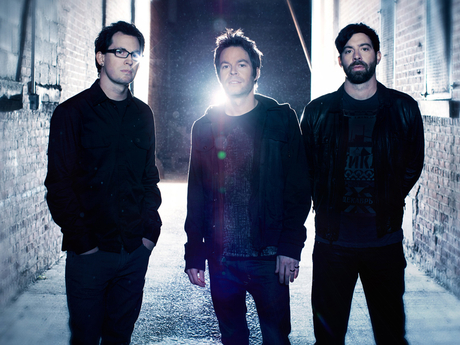
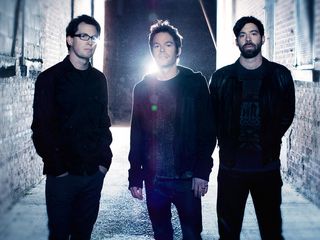
Chevelle are (from left) Sam Loeffler, Pete Loeffler and Dean Barnardini.
Twelve years after releasing their Steve Albini-produced debut, the Chicago-based band Chevelle (Pete Loeffler, guitar/vocals; Sam Loeffler, drums; and Dean Bernardini, bass/vocals) have issued their latest disc, Hats Off To The Bull, their sixth long player in all and one that's loaded with radio-bound hooks, pulverizing riffs and deadly grooves.
The record's been out for only a week and it looks as if it could be one of Chevelle's most successful discs to date. Face To The Floor, a scalding rocker, has been number one at multiple radio formats for over a month now. "We're off to a good start," says Sam Loeffler. "Right now we're doing a pretty hectic promo tour, hitting radio shows in various markets - just getting the word out that we have a new record."
Although word already seems to be out. MusicRadar caught up with Loeffler to talk about the making of Hats Off To The Bull, his drum setup, and how Chevelle manages to thrive in these trying times for the record business.
Across the board, artists don't sell the amount of CDs that they used to. With the changing economics of the music business, how hard is it to keep a band going these days?
"I would say, based on the bands that were around when we started, and the fact that pretty much all of them are gone now, it's pretty difficult. You know, there's a quick-math approach to all of this: Whatever a band sells nowadays, multiply that number by 10 and that's how many times their album has been downloaded without being paid for.
"People are still into music. It's just that everybody has gotten used to having exactly what they want, when they want it. Obviously, that doesn't translate into money for artists. So yeah, to keep a rock band on the road is extremely hard.
Get the MusicRadar Newsletter
Want all the hottest music and gear news, reviews, deals, features and more, direct to your inbox? Sign up here.
"On the other hand, if you can keep writing music that people like, you can keep a career going. I have to think, out of all of those bands that aren't around anymore, the reason why they're gone is because they wrote bad records."
Given the downward trend in actual music sales, has it changed the way Chevelle functions?
"To be honest, I don't think there was ever a time when bands made money off of CD sales - not unless you sold millions and millions. I mean, our first record for Epic has sold something like 1.6 million copies at this point, and we never made a penny from it. But that's very, very normal. That's record company math.
"That being said, you can work within the system and get things done. If you're only playing to 500 people a night, you don't go out with two trucks and three buses and all of this production. That's just crazy. Scale things down. Don't price yourself out of your audience."
For the new record, was the band's agenda any different?
"I don't think so. We just wanted to write music that we love. We're a hard rock melodic band - that's the music that inspires us, and that's what we want to write and play every night. Writing the best possible music we could was our agenda.
"But we did want to get a little experimental, and because we were working with Joe Barresi [Queens Of The Stone Age, Coheed And Cambria] we were able to do so."
How was Joe different from other producers you've worked with?
"Joe's the best! He's a very open-minded guy. He would say to us, 'Let's try something. It might not work, but let's see.' So he would push us in certain ways like that. That kind of approach really works with us. Plus, he was very firm that we had to have our songs down before we went into the studio, so he worked with us during pre-production to make sure everything was there.
"We had 13 songs when we went into the studio with Joe, and we felt really great about all of them. Pete is always writing. Every day, no matter what, he's writing. But he tends to write pieces of songs a lot. He shows us those pieces and then the songs take shape."
Because you're his brother, are you harder on Pete than Dean can be?
"Mmm, I don't think so. We have a pretty good system. Pete likes to say I have a 'cheese meter.' So I can tell Pete, 'Oh, that doesn't really work there' - and then we'll just get rid of a part. But it's never, 'I don't like this song.' We never bail on a whole song; we don't let it get to that point."
Does Dean ever have to referee brotherly arguments?
"Not really. If Pete and I start to argue, Dean just gets quiet and waits for us to stop. He doesn't really take sides. But there are times during debates where Dean will have to be the tie-breaker."
Let's talk about some of the new songs. Face To The Floor is a little different for you guys - it's almost stoner rock.
[laughs] "That's cool! Yeah, that's what I got from it. When we wrote it, we were like, 'That's kind of a Clutch/ Queens Of The Stone Age vibe.' You're the first person to say that. Most people call it 'hard rock.' And when I think of hard rock, I think of Lamb Of God.
"Face To The Floor is pretty cool. It was inspired by Bernie Madoff and the whole Ponzi scheme thing, which I think is a great subject for a song. When you consider what's going on with our financial system and how it's been mismanaged, the song is pretty timely."
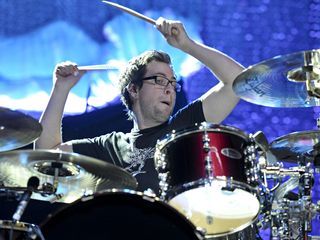
Loeffler about to attack those Zildjians, 2011. © Amy Harris/Corbis
As a drummer, how did you approach the song?
"My whole attitude is to back up the main guitar riff. At the same time, I don't want to get in the way of the melody - and the riff is very much a melody. So I have to try to play efficiently and solidly, nothing too flashy."
The Meddler is a very cool track - it's got a lot of atmospherics.
"That's probably my favorite song on the record. I'm playing a pretty straight-ahead backbeat on it. I wanted to back up that bassline, which is such a cool, driving, walking part. I felt like that was a hook and I wanted to bolster what Dean was doing there. It's such a cool song."
What are your thoughts on Prima Donna? It's pretty much Pete all the way on acoustic guitar and vocals, with some production effects.
"Sometimes you just choose to keep a song in its original version, and that's fine. Pete wrote it as an acoustic song, and it works like that. I think it's great. It's definitely different, but most of our records have had some kind of acoustic thing on them."
Who are your influences as a drummer? Who got you going?
"My biggest influence would be George Hurley from The Minutemen. He's one of the main reasons why I play drums the way I do. Matt Cameron from Soundgarden is also one of my favorite all-time drummers. He's amazing. Those two guys are the big ones for me."
What does your kit consist of?
"I play a Pearl kit with Zildjian cymbals. I like a simple setup, so my kit is a four-piece. I think it's cool to do as much as you can on as little as you can."
Are there areas of your playing you'd like to improve?
"Oh, definitely! Without a doubt, the speed of my hands. I wish I could play faster stuff, so that's something I'd like to improve. And I love syncopated beats, so I'd like to try to work on that kind of thing more. But hand speed is the number one thing. Everybody can always get better."
Joe is a freelance journalist who has, over the past few decades, interviewed hundreds of guitarists for Guitar World, Guitar Player, MusicRadar and Classic Rock. He is also a former editor of Guitar World, contributing writer for Guitar Aficionado and VP of A&R for Island Records. He’s an enthusiastic guitarist, but he’s nowhere near the likes of the people he interviews. Surprisingly, his skills are more suited to the drums. If you need a drummer for your Beatles tribute band, look him up.
![Chris Hayes [left] wears a purple checked shirt and plays his 1957 Stratocaster in the studio; Michael J. Fox tears it up onstage as Marty McFly in the 1985 blockbuster Back To The Future.](https://cdn.mos.cms.futurecdn.net/nWZUSbFAwA6EqQdruLmXXh-840-80.jpg)
“We’re looking at the movie going, ‘Urgh! It’s kinda cheesy. I don’t know if this is going to work”: How Chris Hayes wrote Huey Lewis and the News’ Back To The Future hit Power Of Love in his pyjamas
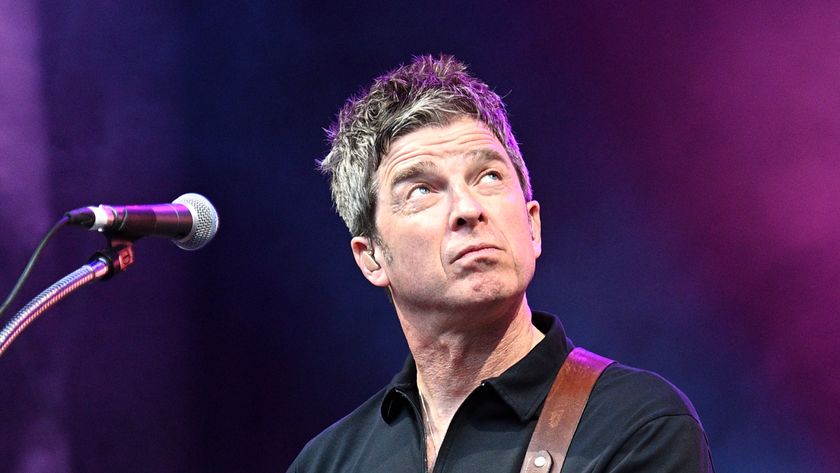
“I thought it’d be a big deal, but I was a bit taken aback by just how much of a big deal it was”: Noel Gallagher finally speaks about Oasis ticket chaos

